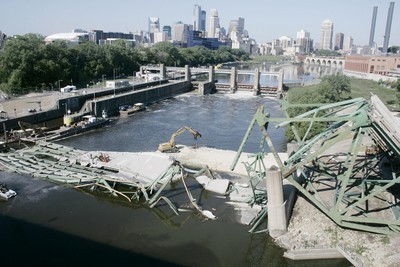Bridges won’t get earmark money
WASHINGTON -- The Senate voted last week to kill an amendment that called for a freeze on earmarked road spending until all the nation's deficient bridges are fixed.
Senators by an 82-14 vote rejected the proposal by Sen. Tom Coburn, R-Okla., one of the leading critics of earmarks.
Coburn said the collapse this summer of the Interstate 35W bridge in Minneapolis was a wake-up call.
"In this bill, are over 500 earmarks that come to over $2.8 billion," Coburn said, arguing that more money sent to favored home state projects meant less for national needs.
"By defending this special interest system, my colleagues once again put their perceived political safety ahead of public safety," he said.
Sen. Christopher Bond, R-Mo., opposed the amendment, saying Coburn's comments linking earmarks to bridge tragedies "is a bridge too far."
"Earmarks are not taking away money from bridges," Bond said.
In Missouri, he said, "everything that has been earmarked is on the state implementation plan. It is a priority. And most of them are highly significant priorities for safety, whether it is bridges or highways."
Sen. John Ensign, R-Nev., voted for the amendment. Sen. Harry Reid, D-Nev., voted against it.
A second Coburn amendment, to redirect federal spending on bike paths into bridge repairs, also was killed. The vote was 80-18.
"We should not be spending money on bicycle paths for our own leisure, comfort and exercise when we have bridges that are falling down," Coburn said, estimating federal bike path spending at between $12 million and $18 million.
Sen. Patty Murray, D-Wash., responded that spending on bike paths and walkways is for safety.
"What we are essentially doing in many of our communities is protecting the safety of our families and our neighbors," Murray said. "In many of these communities, without those paths, many more bicyclists and pedestrians would be forced to commute with regular vehicle traffic."
Ensign and Reid voted against the amendment.
BRIDGE FUNDING BOOSTED
The Senate voted to allocate an additional $1 billion out of the Highway Trust Fund for bridge repairs.
Sen. Patty Murray, D-Wash., said the Minneapolis bridge collapse "has appropriately focused the nation on whether we are investing adequately in a national highway system that is fragile and aging."
But Sen. Christopher Bond, R-Mo., cautioned restraint. He pointed out that most deaths on U.S. roads do not occur on bridges but on highways.
"I do have a feeling we should not overreact to the Minnesota bridge collapse by spending more money out of the highway trust fund," Bond said. "The best estimate we have from the U.S. Department of Transportation is that approximately only 2,200 out of 40,000 deaths occurred on bridges."
The Murray amendment passed 60-33. Reid voted for it while Ensign voted against it.
MEXICAN TRUCKS RESTRICTED
Over President Bush's objections, the Senate voted to ban Mexican trucks from most U.S. highways.
Sen. Byron Dorgan, D-N.D., said there are not equivalent truck safety standards between the United States and Mexico.
His amendment, which passed 72-23, would scuttle a test program granting Mexican trucks greater access to the United States beyond a commercial border zone that runs about 20 miles inland. In Arizona, the zone stretches 75 miles.
Reid and Ensign voted against expanding U.S. access for Mexican trucks.
The Dorgan amendment was supported by most Democrats and was applauded by the Teamsters Union.
To strengthen their argument, Dorgan and his allies cited an accident that occurred just the day before. A truck in Mexico carrying explosives collided with another vehicle, causing a massive explosion that killed 37 people and injured 150.
"Now, we know what would happen in this country if you were driving a truck with explosives on board," Dorgan said. "We have safety requirements that are stringently enforced."
Sen. John Cornyn, R-Texas, countered that the United States was obliged to move forward with the trucking program under the North American Free Trade Agreement.
Cornyn suggested boosting truck inspections at the border.
"I believe that instead of trying to kill this program, which will violate the treaty obligations of the United States of America, we in Congress have a duty to find workable solutions," Cornyn said.

















